History 18: Exploring the July Crisis and the Origins of World War I
VerifiedAdded on 2022/08/29
|19
|5832
|15
Essay
AI Summary
This essay delves into the July Crisis of 1914, examining the events leading to the outbreak of World War I. It analyzes the assassination of Archduke Franz Ferdinand by Gavrilo Princip, the actions of Serbia and Austria-Hungary, and the roles of major European powers. The paper explores the perspectives of various historians, including Annika Mombauer, James Joll, and Joseph V. Micallef, on the causes and responsibilities for the war. It discusses the political tensions, diplomatic failures, and nationalist sentiments that contributed to the escalation of the crisis. The essay also examines the actions of Germany, Russia, and Britain, highlighting the complex interplay of alliances, ambitions, and miscalculations that ultimately led to global conflict. The paper considers the roles of key figures and the impact of their decisions on the unfolding events, providing a comprehensive overview of the historical context and the diverse interpretations surrounding the origins of the First World War.
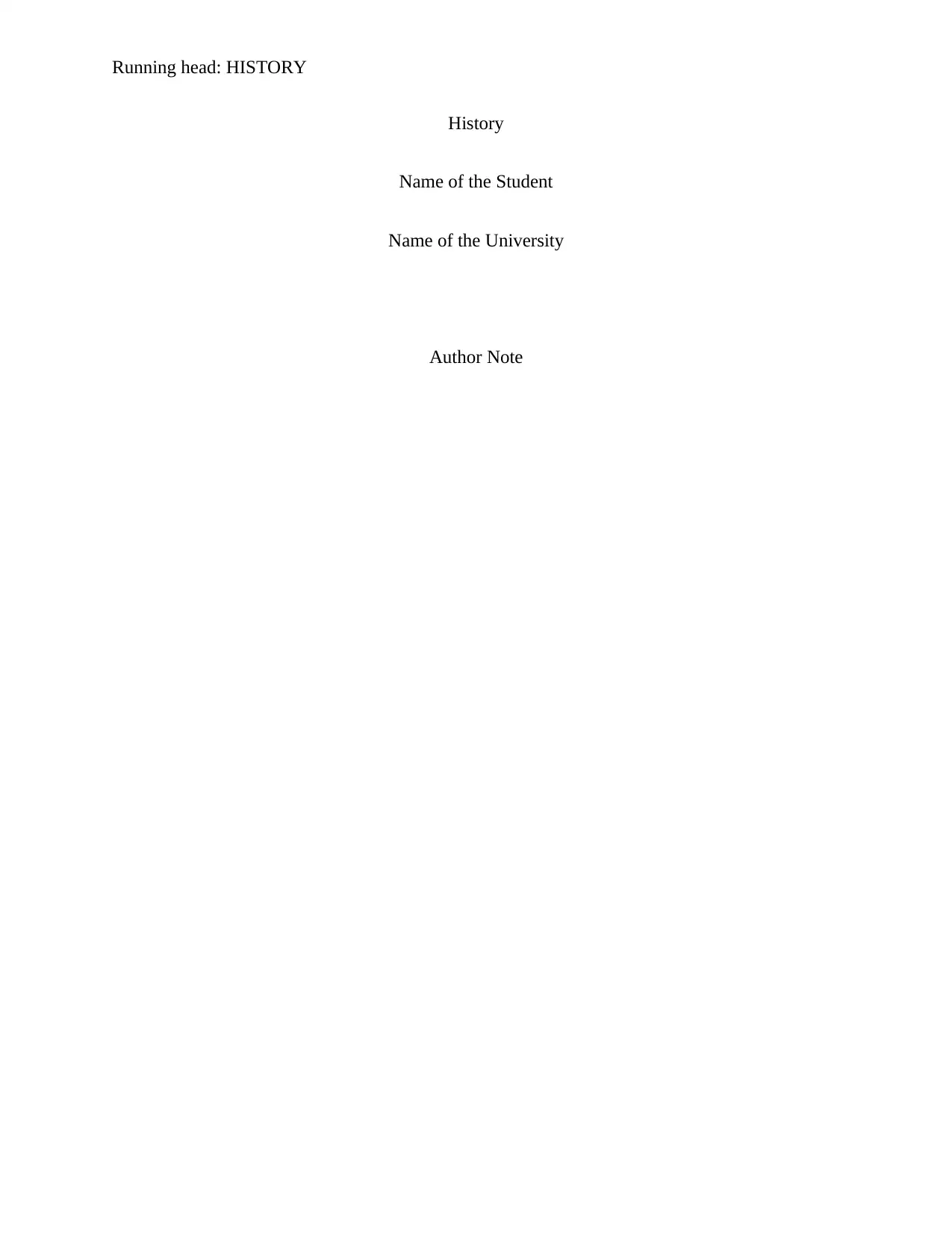
Running head: HISTORY
History
Name of the Student
Name of the University
Author Note
History
Name of the Student
Name of the University
Author Note
Paraphrase This Document
Need a fresh take? Get an instant paraphrase of this document with our AI Paraphraser
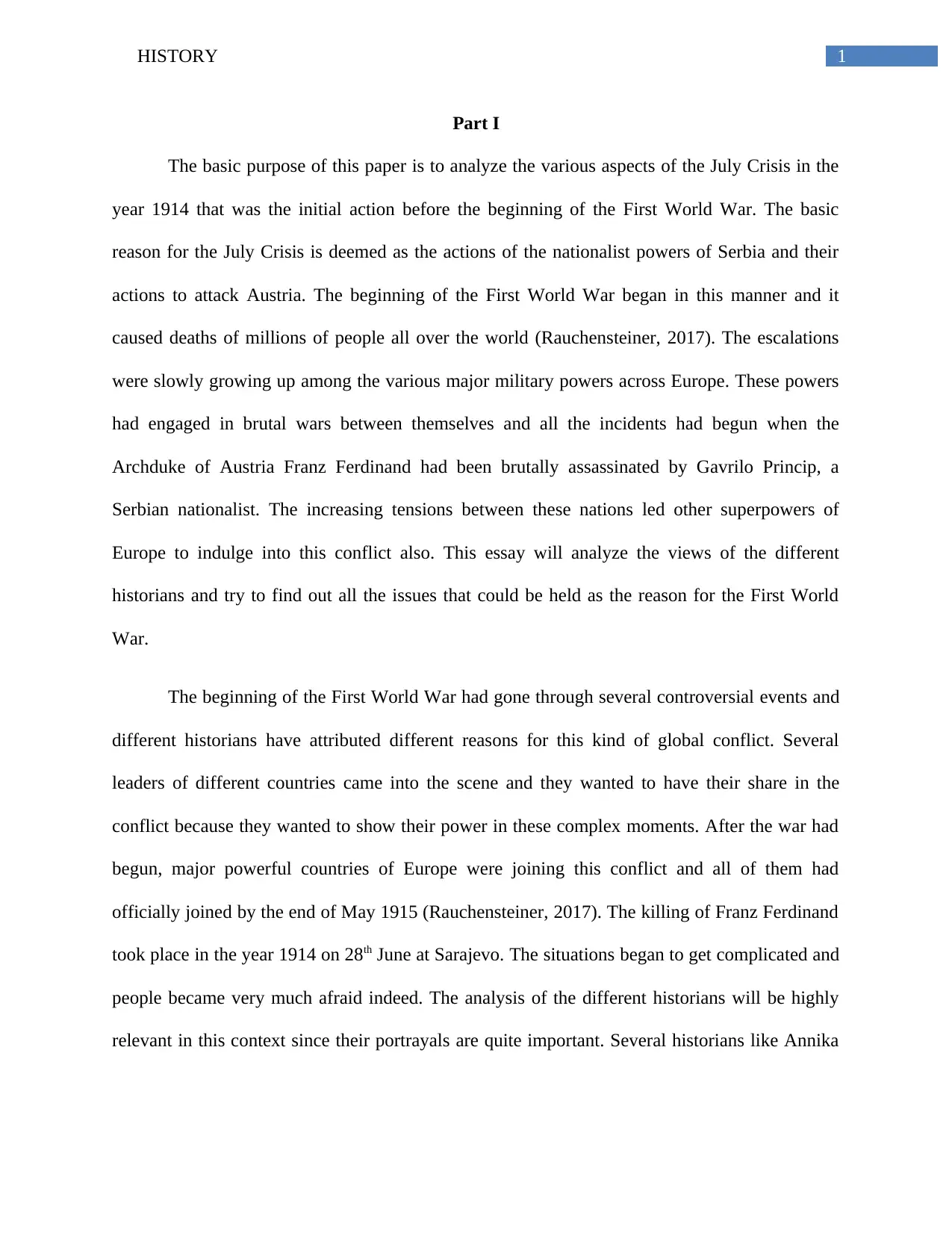
1HISTORY
Part I
The basic purpose of this paper is to analyze the various aspects of the July Crisis in the
year 1914 that was the initial action before the beginning of the First World War. The basic
reason for the July Crisis is deemed as the actions of the nationalist powers of Serbia and their
actions to attack Austria. The beginning of the First World War began in this manner and it
caused deaths of millions of people all over the world (Rauchensteiner, 2017). The escalations
were slowly growing up among the various major military powers across Europe. These powers
had engaged in brutal wars between themselves and all the incidents had begun when the
Archduke of Austria Franz Ferdinand had been brutally assassinated by Gavrilo Princip, a
Serbian nationalist. The increasing tensions between these nations led other superpowers of
Europe to indulge into this conflict also. This essay will analyze the views of the different
historians and try to find out all the issues that could be held as the reason for the First World
War.
The beginning of the First World War had gone through several controversial events and
different historians have attributed different reasons for this kind of global conflict. Several
leaders of different countries came into the scene and they wanted to have their share in the
conflict because they wanted to show their power in these complex moments. After the war had
begun, major powerful countries of Europe were joining this conflict and all of them had
officially joined by the end of May 1915 (Rauchensteiner, 2017). The killing of Franz Ferdinand
took place in the year 1914 on 28th June at Sarajevo. The situations began to get complicated and
people became very much afraid indeed. The analysis of the different historians will be highly
relevant in this context since their portrayals are quite important. Several historians like Annika
Part I
The basic purpose of this paper is to analyze the various aspects of the July Crisis in the
year 1914 that was the initial action before the beginning of the First World War. The basic
reason for the July Crisis is deemed as the actions of the nationalist powers of Serbia and their
actions to attack Austria. The beginning of the First World War began in this manner and it
caused deaths of millions of people all over the world (Rauchensteiner, 2017). The escalations
were slowly growing up among the various major military powers across Europe. These powers
had engaged in brutal wars between themselves and all the incidents had begun when the
Archduke of Austria Franz Ferdinand had been brutally assassinated by Gavrilo Princip, a
Serbian nationalist. The increasing tensions between these nations led other superpowers of
Europe to indulge into this conflict also. This essay will analyze the views of the different
historians and try to find out all the issues that could be held as the reason for the First World
War.
The beginning of the First World War had gone through several controversial events and
different historians have attributed different reasons for this kind of global conflict. Several
leaders of different countries came into the scene and they wanted to have their share in the
conflict because they wanted to show their power in these complex moments. After the war had
begun, major powerful countries of Europe were joining this conflict and all of them had
officially joined by the end of May 1915 (Rauchensteiner, 2017). The killing of Franz Ferdinand
took place in the year 1914 on 28th June at Sarajevo. The situations began to get complicated and
people became very much afraid indeed. The analysis of the different historians will be highly
relevant in this context since their portrayals are quite important. Several historians like Annika
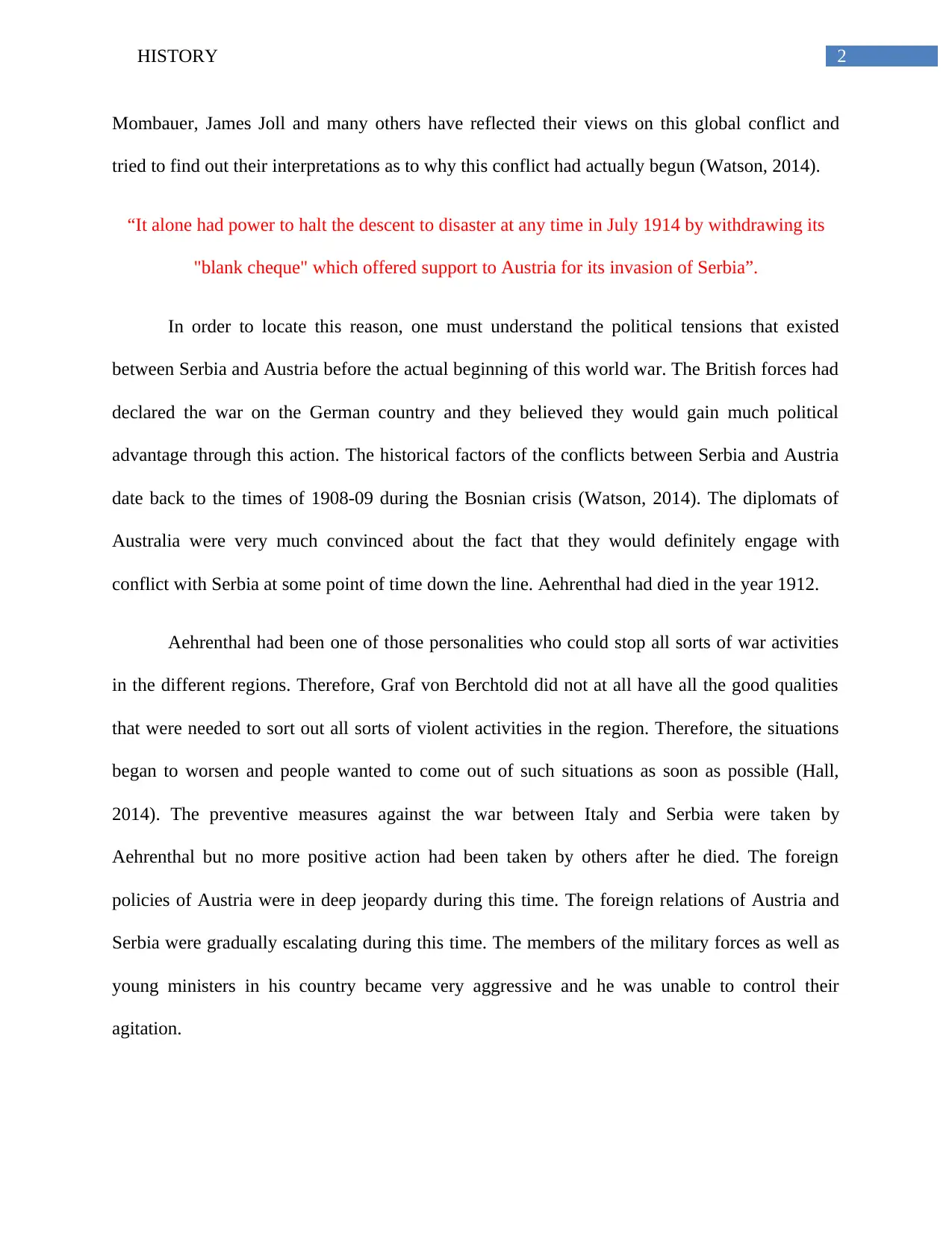
2HISTORY
Mombauer, James Joll and many others have reflected their views on this global conflict and
tried to find out their interpretations as to why this conflict had actually begun (Watson, 2014).
“It alone had power to halt the descent to disaster at any time in July 1914 by withdrawing its
"blank cheque" which offered support to Austria for its invasion of Serbia”.
In order to locate this reason, one must understand the political tensions that existed
between Serbia and Austria before the actual beginning of this world war. The British forces had
declared the war on the German country and they believed they would gain much political
advantage through this action. The historical factors of the conflicts between Serbia and Austria
date back to the times of 1908-09 during the Bosnian crisis (Watson, 2014). The diplomats of
Australia were very much convinced about the fact that they would definitely engage with
conflict with Serbia at some point of time down the line. Aehrenthal had died in the year 1912.
Aehrenthal had been one of those personalities who could stop all sorts of war activities
in the different regions. Therefore, Graf von Berchtold did not at all have all the good qualities
that were needed to sort out all sorts of violent activities in the region. Therefore, the situations
began to worsen and people wanted to come out of such situations as soon as possible (Hall,
2014). The preventive measures against the war between Italy and Serbia were taken by
Aehrenthal but no more positive action had been taken by others after he died. The foreign
policies of Austria were in deep jeopardy during this time. The foreign relations of Austria and
Serbia were gradually escalating during this time. The members of the military forces as well as
young ministers in his country became very aggressive and he was unable to control their
agitation.
Mombauer, James Joll and many others have reflected their views on this global conflict and
tried to find out their interpretations as to why this conflict had actually begun (Watson, 2014).
“It alone had power to halt the descent to disaster at any time in July 1914 by withdrawing its
"blank cheque" which offered support to Austria for its invasion of Serbia”.
In order to locate this reason, one must understand the political tensions that existed
between Serbia and Austria before the actual beginning of this world war. The British forces had
declared the war on the German country and they believed they would gain much political
advantage through this action. The historical factors of the conflicts between Serbia and Austria
date back to the times of 1908-09 during the Bosnian crisis (Watson, 2014). The diplomats of
Australia were very much convinced about the fact that they would definitely engage with
conflict with Serbia at some point of time down the line. Aehrenthal had died in the year 1912.
Aehrenthal had been one of those personalities who could stop all sorts of war activities
in the different regions. Therefore, Graf von Berchtold did not at all have all the good qualities
that were needed to sort out all sorts of violent activities in the region. Therefore, the situations
began to worsen and people wanted to come out of such situations as soon as possible (Hall,
2014). The preventive measures against the war between Italy and Serbia were taken by
Aehrenthal but no more positive action had been taken by others after he died. The foreign
policies of Austria were in deep jeopardy during this time. The foreign relations of Austria and
Serbia were gradually escalating during this time. The members of the military forces as well as
young ministers in his country became very aggressive and he was unable to control their
agitation.
⊘ This is a preview!⊘
Do you want full access?
Subscribe today to unlock all pages.

Trusted by 1+ million students worldwide
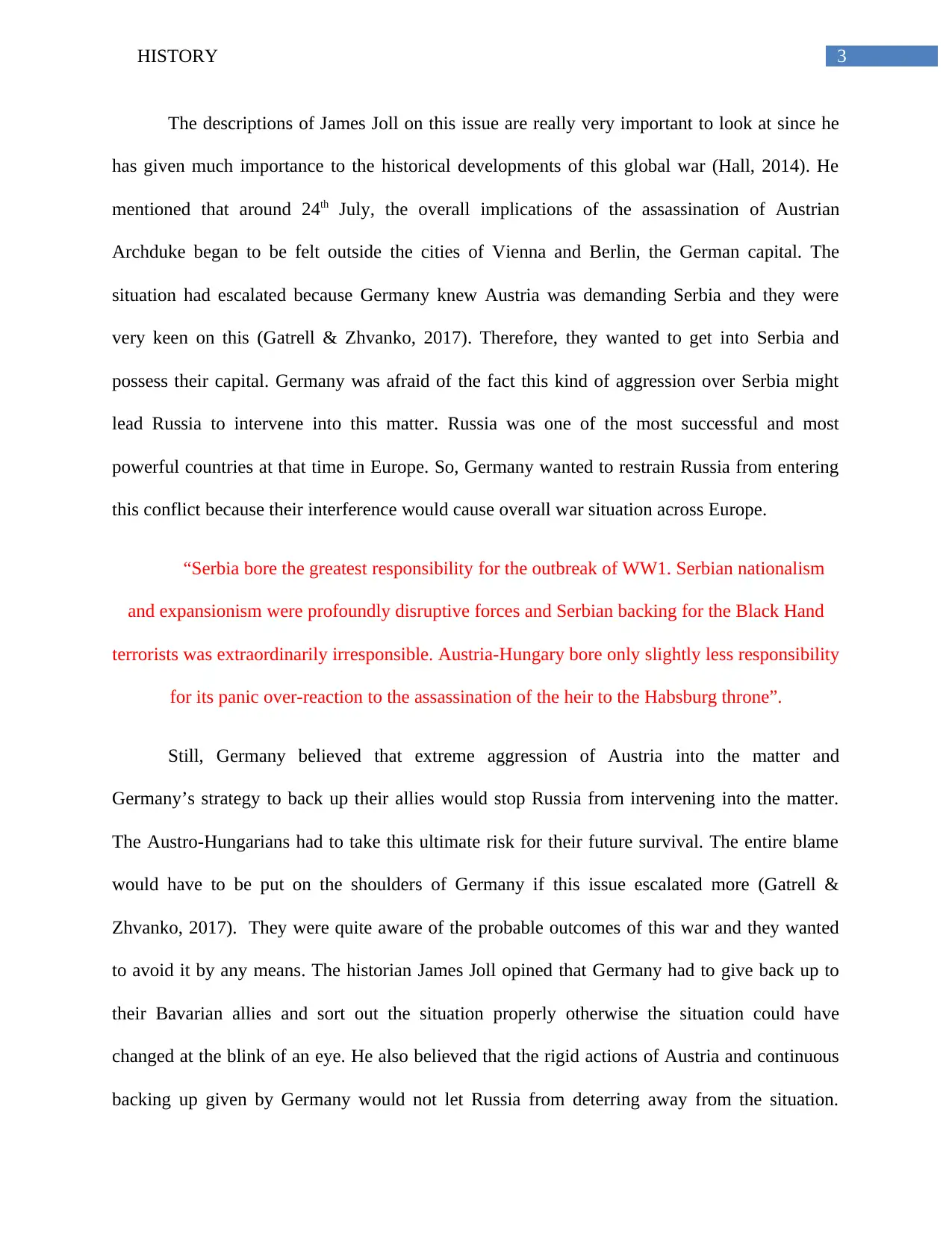
3HISTORY
The descriptions of James Joll on this issue are really very important to look at since he
has given much importance to the historical developments of this global war (Hall, 2014). He
mentioned that around 24th July, the overall implications of the assassination of Austrian
Archduke began to be felt outside the cities of Vienna and Berlin, the German capital. The
situation had escalated because Germany knew Austria was demanding Serbia and they were
very keen on this (Gatrell & Zhvanko, 2017). Therefore, they wanted to get into Serbia and
possess their capital. Germany was afraid of the fact this kind of aggression over Serbia might
lead Russia to intervene into this matter. Russia was one of the most successful and most
powerful countries at that time in Europe. So, Germany wanted to restrain Russia from entering
this conflict because their interference would cause overall war situation across Europe.
“Serbia bore the greatest responsibility for the outbreak of WW1. Serbian nationalism
and expansionism were profoundly disruptive forces and Serbian backing for the Black Hand
terrorists was extraordinarily irresponsible. Austria-Hungary bore only slightly less responsibility
for its panic over-reaction to the assassination of the heir to the Habsburg throne”.
Still, Germany believed that extreme aggression of Austria into the matter and
Germany’s strategy to back up their allies would stop Russia from intervening into the matter.
The Austro-Hungarians had to take this ultimate risk for their future survival. The entire blame
would have to be put on the shoulders of Germany if this issue escalated more (Gatrell &
Zhvanko, 2017). They were quite aware of the probable outcomes of this war and they wanted
to avoid it by any means. The historian James Joll opined that Germany had to give back up to
their Bavarian allies and sort out the situation properly otherwise the situation could have
changed at the blink of an eye. He also believed that the rigid actions of Austria and continuous
backing up given by Germany would not let Russia from deterring away from the situation.
The descriptions of James Joll on this issue are really very important to look at since he
has given much importance to the historical developments of this global war (Hall, 2014). He
mentioned that around 24th July, the overall implications of the assassination of Austrian
Archduke began to be felt outside the cities of Vienna and Berlin, the German capital. The
situation had escalated because Germany knew Austria was demanding Serbia and they were
very keen on this (Gatrell & Zhvanko, 2017). Therefore, they wanted to get into Serbia and
possess their capital. Germany was afraid of the fact this kind of aggression over Serbia might
lead Russia to intervene into this matter. Russia was one of the most successful and most
powerful countries at that time in Europe. So, Germany wanted to restrain Russia from entering
this conflict because their interference would cause overall war situation across Europe.
“Serbia bore the greatest responsibility for the outbreak of WW1. Serbian nationalism
and expansionism were profoundly disruptive forces and Serbian backing for the Black Hand
terrorists was extraordinarily irresponsible. Austria-Hungary bore only slightly less responsibility
for its panic over-reaction to the assassination of the heir to the Habsburg throne”.
Still, Germany believed that extreme aggression of Austria into the matter and
Germany’s strategy to back up their allies would stop Russia from intervening into the matter.
The Austro-Hungarians had to take this ultimate risk for their future survival. The entire blame
would have to be put on the shoulders of Germany if this issue escalated more (Gatrell &
Zhvanko, 2017). They were quite aware of the probable outcomes of this war and they wanted
to avoid it by any means. The historian James Joll opined that Germany had to give back up to
their Bavarian allies and sort out the situation properly otherwise the situation could have
changed at the blink of an eye. He also believed that the rigid actions of Austria and continuous
backing up given by Germany would not let Russia from deterring away from the situation.
Paraphrase This Document
Need a fresh take? Get an instant paraphrase of this document with our AI Paraphraser
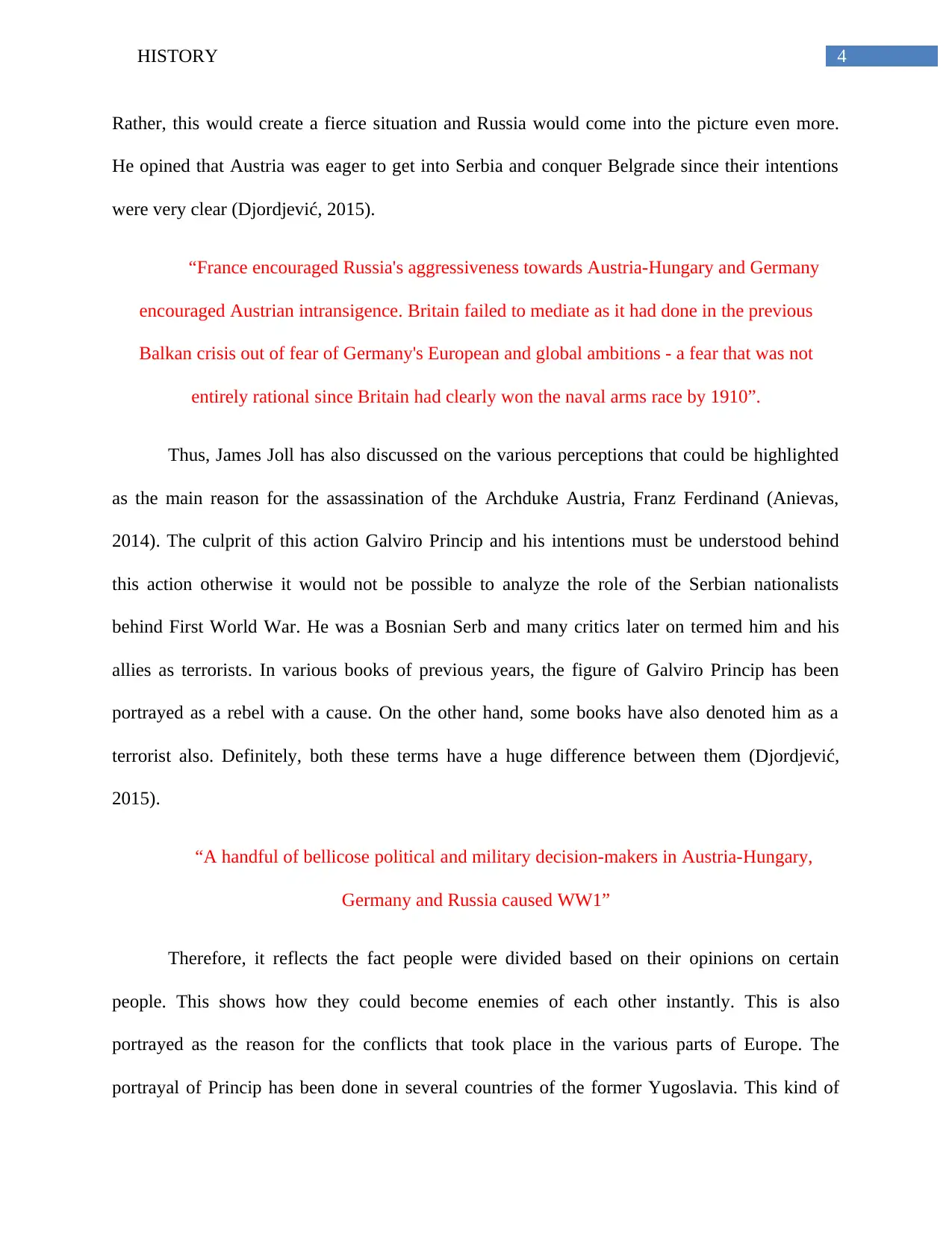
4HISTORY
Rather, this would create a fierce situation and Russia would come into the picture even more.
He opined that Austria was eager to get into Serbia and conquer Belgrade since their intentions
were very clear (Djordjević, 2015).
“France encouraged Russia's aggressiveness towards Austria-Hungary and Germany
encouraged Austrian intransigence. Britain failed to mediate as it had done in the previous
Balkan crisis out of fear of Germany's European and global ambitions - a fear that was not
entirely rational since Britain had clearly won the naval arms race by 1910”.
Thus, James Joll has also discussed on the various perceptions that could be highlighted
as the main reason for the assassination of the Archduke Austria, Franz Ferdinand (Anievas,
2014). The culprit of this action Galviro Princip and his intentions must be understood behind
this action otherwise it would not be possible to analyze the role of the Serbian nationalists
behind First World War. He was a Bosnian Serb and many critics later on termed him and his
allies as terrorists. In various books of previous years, the figure of Galviro Princip has been
portrayed as a rebel with a cause. On the other hand, some books have also denoted him as a
terrorist also. Definitely, both these terms have a huge difference between them (Djordjević,
2015).
“A handful of bellicose political and military decision-makers in Austria-Hungary,
Germany and Russia caused WW1”
Therefore, it reflects the fact people were divided based on their opinions on certain
people. This shows how they could become enemies of each other instantly. This is also
portrayed as the reason for the conflicts that took place in the various parts of Europe. The
portrayal of Princip has been done in several countries of the former Yugoslavia. This kind of
Rather, this would create a fierce situation and Russia would come into the picture even more.
He opined that Austria was eager to get into Serbia and conquer Belgrade since their intentions
were very clear (Djordjević, 2015).
“France encouraged Russia's aggressiveness towards Austria-Hungary and Germany
encouraged Austrian intransigence. Britain failed to mediate as it had done in the previous
Balkan crisis out of fear of Germany's European and global ambitions - a fear that was not
entirely rational since Britain had clearly won the naval arms race by 1910”.
Thus, James Joll has also discussed on the various perceptions that could be highlighted
as the main reason for the assassination of the Archduke Austria, Franz Ferdinand (Anievas,
2014). The culprit of this action Galviro Princip and his intentions must be understood behind
this action otherwise it would not be possible to analyze the role of the Serbian nationalists
behind First World War. He was a Bosnian Serb and many critics later on termed him and his
allies as terrorists. In various books of previous years, the figure of Galviro Princip has been
portrayed as a rebel with a cause. On the other hand, some books have also denoted him as a
terrorist also. Definitely, both these terms have a huge difference between them (Djordjević,
2015).
“A handful of bellicose political and military decision-makers in Austria-Hungary,
Germany and Russia caused WW1”
Therefore, it reflects the fact people were divided based on their opinions on certain
people. This shows how they could become enemies of each other instantly. This is also
portrayed as the reason for the conflicts that took place in the various parts of Europe. The
portrayal of Princip has been done in several countries of the former Yugoslavia. This kind of
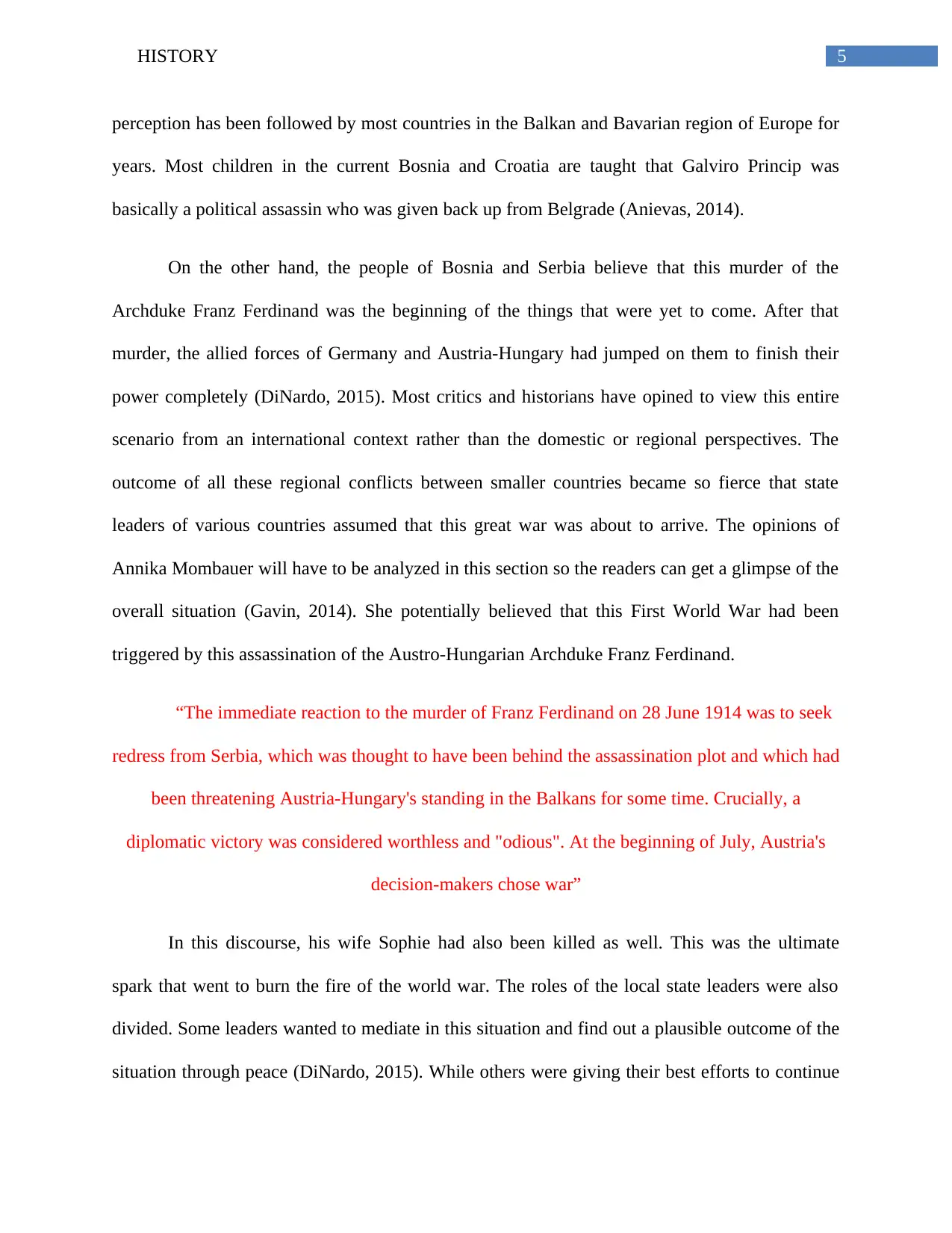
5HISTORY
perception has been followed by most countries in the Balkan and Bavarian region of Europe for
years. Most children in the current Bosnia and Croatia are taught that Galviro Princip was
basically a political assassin who was given back up from Belgrade (Anievas, 2014).
On the other hand, the people of Bosnia and Serbia believe that this murder of the
Archduke Franz Ferdinand was the beginning of the things that were yet to come. After that
murder, the allied forces of Germany and Austria-Hungary had jumped on them to finish their
power completely (DiNardo, 2015). Most critics and historians have opined to view this entire
scenario from an international context rather than the domestic or regional perspectives. The
outcome of all these regional conflicts between smaller countries became so fierce that state
leaders of various countries assumed that this great war was about to arrive. The opinions of
Annika Mombauer will have to be analyzed in this section so the readers can get a glimpse of the
overall situation (Gavin, 2014). She potentially believed that this First World War had been
triggered by this assassination of the Austro-Hungarian Archduke Franz Ferdinand.
“The immediate reaction to the murder of Franz Ferdinand on 28 June 1914 was to seek
redress from Serbia, which was thought to have been behind the assassination plot and which had
been threatening Austria-Hungary's standing in the Balkans for some time. Crucially, a
diplomatic victory was considered worthless and "odious". At the beginning of July, Austria's
decision-makers chose war”
In this discourse, his wife Sophie had also been killed as well. This was the ultimate
spark that went to burn the fire of the world war. The roles of the local state leaders were also
divided. Some leaders wanted to mediate in this situation and find out a plausible outcome of the
situation through peace (DiNardo, 2015). While others were giving their best efforts to continue
perception has been followed by most countries in the Balkan and Bavarian region of Europe for
years. Most children in the current Bosnia and Croatia are taught that Galviro Princip was
basically a political assassin who was given back up from Belgrade (Anievas, 2014).
On the other hand, the people of Bosnia and Serbia believe that this murder of the
Archduke Franz Ferdinand was the beginning of the things that were yet to come. After that
murder, the allied forces of Germany and Austria-Hungary had jumped on them to finish their
power completely (DiNardo, 2015). Most critics and historians have opined to view this entire
scenario from an international context rather than the domestic or regional perspectives. The
outcome of all these regional conflicts between smaller countries became so fierce that state
leaders of various countries assumed that this great war was about to arrive. The opinions of
Annika Mombauer will have to be analyzed in this section so the readers can get a glimpse of the
overall situation (Gavin, 2014). She potentially believed that this First World War had been
triggered by this assassination of the Austro-Hungarian Archduke Franz Ferdinand.
“The immediate reaction to the murder of Franz Ferdinand on 28 June 1914 was to seek
redress from Serbia, which was thought to have been behind the assassination plot and which had
been threatening Austria-Hungary's standing in the Balkans for some time. Crucially, a
diplomatic victory was considered worthless and "odious". At the beginning of July, Austria's
decision-makers chose war”
In this discourse, his wife Sophie had also been killed as well. This was the ultimate
spark that went to burn the fire of the world war. The roles of the local state leaders were also
divided. Some leaders wanted to mediate in this situation and find out a plausible outcome of the
situation through peace (DiNardo, 2015). While others were giving their best efforts to continue
⊘ This is a preview!⊘
Do you want full access?
Subscribe today to unlock all pages.

Trusted by 1+ million students worldwide
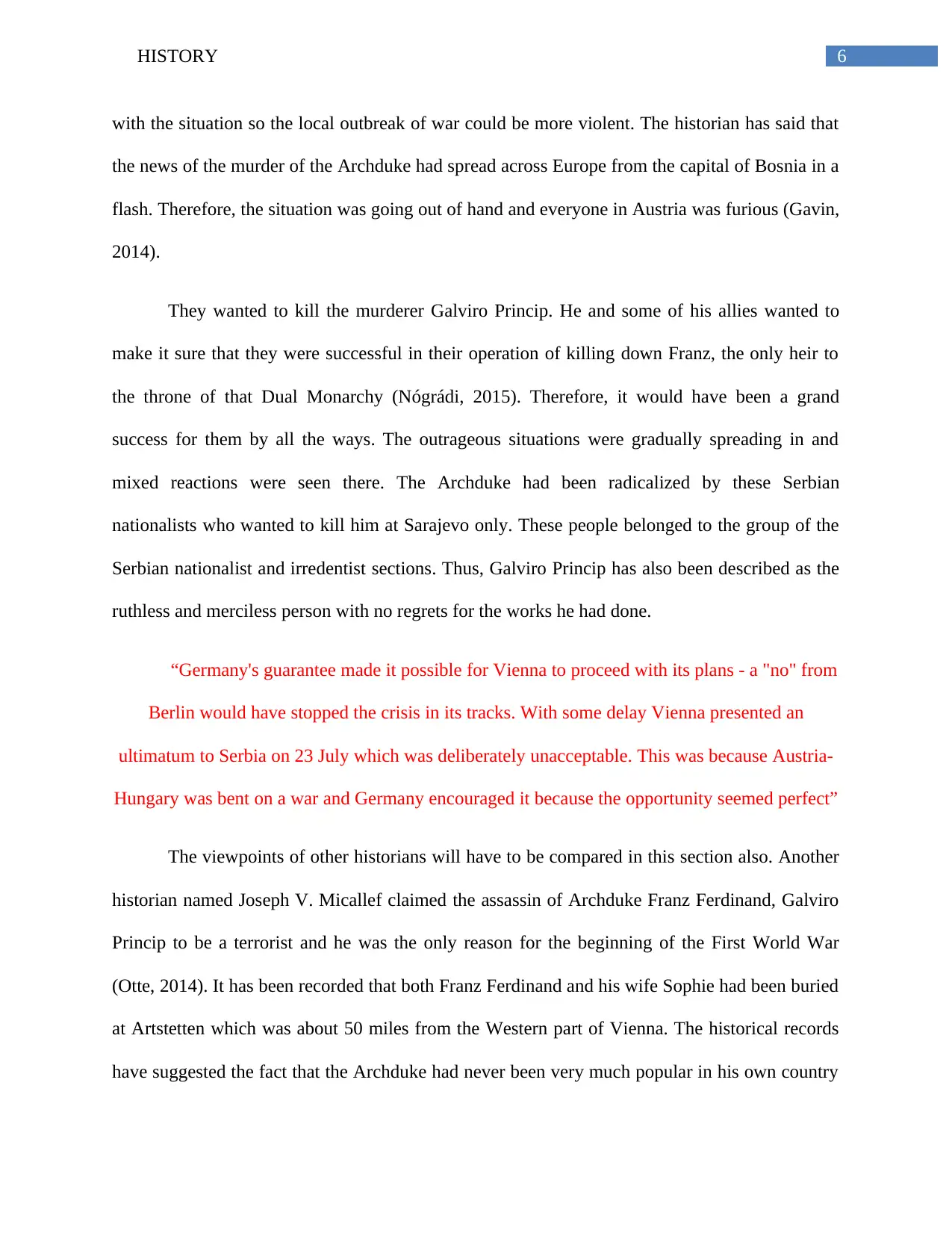
6HISTORY
with the situation so the local outbreak of war could be more violent. The historian has said that
the news of the murder of the Archduke had spread across Europe from the capital of Bosnia in a
flash. Therefore, the situation was going out of hand and everyone in Austria was furious (Gavin,
2014).
They wanted to kill the murderer Galviro Princip. He and some of his allies wanted to
make it sure that they were successful in their operation of killing down Franz, the only heir to
the throne of that Dual Monarchy (Nógrádi, 2015). Therefore, it would have been a grand
success for them by all the ways. The outrageous situations were gradually spreading in and
mixed reactions were seen there. The Archduke had been radicalized by these Serbian
nationalists who wanted to kill him at Sarajevo only. These people belonged to the group of the
Serbian nationalist and irredentist sections. Thus, Galviro Princip has also been described as the
ruthless and merciless person with no regrets for the works he had done.
“Germany's guarantee made it possible for Vienna to proceed with its plans - a "no" from
Berlin would have stopped the crisis in its tracks. With some delay Vienna presented an
ultimatum to Serbia on 23 July which was deliberately unacceptable. This was because Austria-
Hungary was bent on a war and Germany encouraged it because the opportunity seemed perfect”
The viewpoints of other historians will have to be compared in this section also. Another
historian named Joseph V. Micallef claimed the assassin of Archduke Franz Ferdinand, Galviro
Princip to be a terrorist and he was the only reason for the beginning of the First World War
(Otte, 2014). It has been recorded that both Franz Ferdinand and his wife Sophie had been buried
at Artstetten which was about 50 miles from the Western part of Vienna. The historical records
have suggested the fact that the Archduke had never been very much popular in his own country
with the situation so the local outbreak of war could be more violent. The historian has said that
the news of the murder of the Archduke had spread across Europe from the capital of Bosnia in a
flash. Therefore, the situation was going out of hand and everyone in Austria was furious (Gavin,
2014).
They wanted to kill the murderer Galviro Princip. He and some of his allies wanted to
make it sure that they were successful in their operation of killing down Franz, the only heir to
the throne of that Dual Monarchy (Nógrádi, 2015). Therefore, it would have been a grand
success for them by all the ways. The outrageous situations were gradually spreading in and
mixed reactions were seen there. The Archduke had been radicalized by these Serbian
nationalists who wanted to kill him at Sarajevo only. These people belonged to the group of the
Serbian nationalist and irredentist sections. Thus, Galviro Princip has also been described as the
ruthless and merciless person with no regrets for the works he had done.
“Germany's guarantee made it possible for Vienna to proceed with its plans - a "no" from
Berlin would have stopped the crisis in its tracks. With some delay Vienna presented an
ultimatum to Serbia on 23 July which was deliberately unacceptable. This was because Austria-
Hungary was bent on a war and Germany encouraged it because the opportunity seemed perfect”
The viewpoints of other historians will have to be compared in this section also. Another
historian named Joseph V. Micallef claimed the assassin of Archduke Franz Ferdinand, Galviro
Princip to be a terrorist and he was the only reason for the beginning of the First World War
(Otte, 2014). It has been recorded that both Franz Ferdinand and his wife Sophie had been buried
at Artstetten which was about 50 miles from the Western part of Vienna. The historical records
have suggested the fact that the Archduke had never been very much popular in his own country
Paraphrase This Document
Need a fresh take? Get an instant paraphrase of this document with our AI Paraphraser
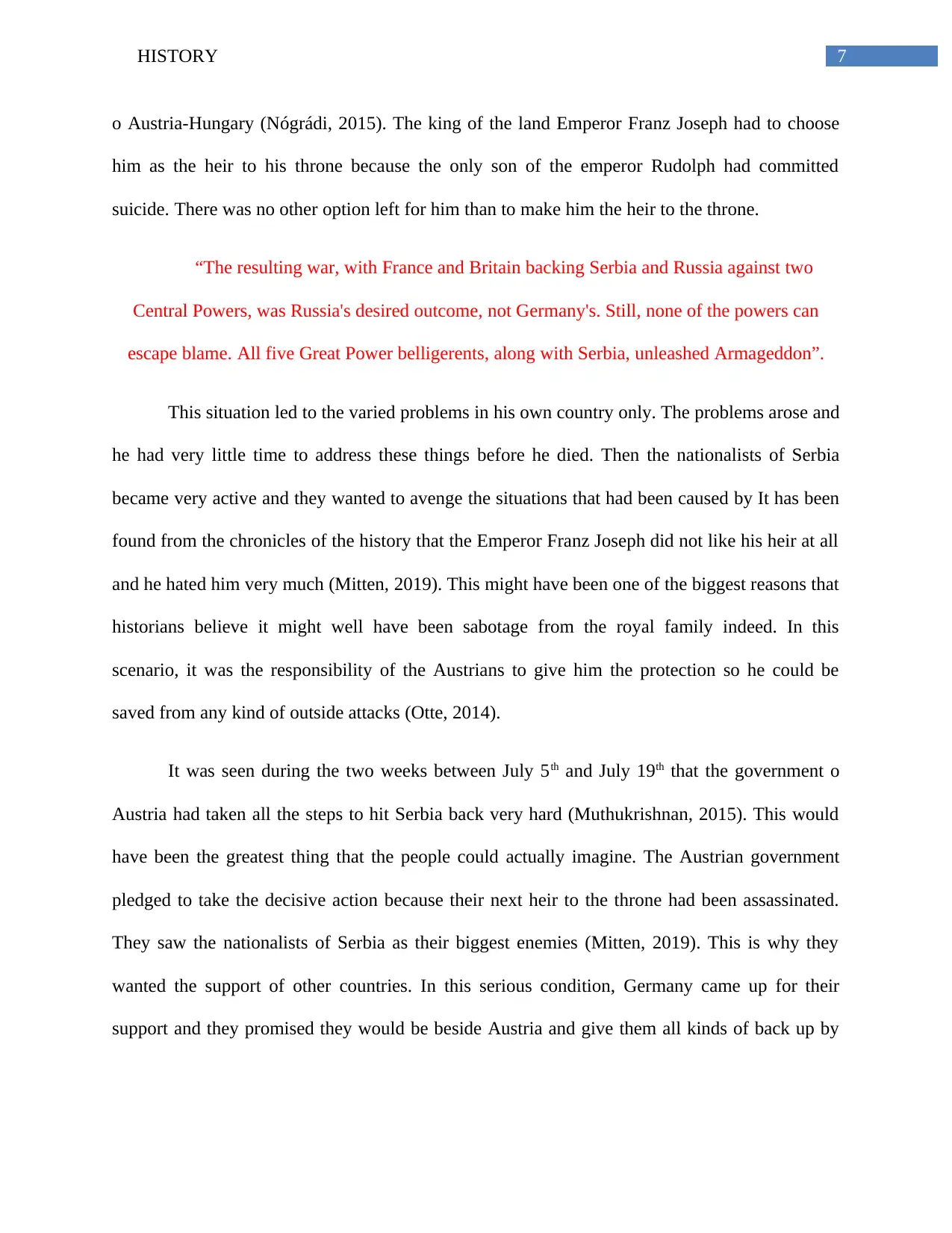
7HISTORY
o Austria-Hungary (Nógrádi, 2015). The king of the land Emperor Franz Joseph had to choose
him as the heir to his throne because the only son of the emperor Rudolph had committed
suicide. There was no other option left for him than to make him the heir to the throne.
“The resulting war, with France and Britain backing Serbia and Russia against two
Central Powers, was Russia's desired outcome, not Germany's. Still, none of the powers can
escape blame. All five Great Power belligerents, along with Serbia, unleashed Armageddon”.
This situation led to the varied problems in his own country only. The problems arose and
he had very little time to address these things before he died. Then the nationalists of Serbia
became very active and they wanted to avenge the situations that had been caused by It has been
found from the chronicles of the history that the Emperor Franz Joseph did not like his heir at all
and he hated him very much (Mitten, 2019). This might have been one of the biggest reasons that
historians believe it might well have been sabotage from the royal family indeed. In this
scenario, it was the responsibility of the Austrians to give him the protection so he could be
saved from any kind of outside attacks (Otte, 2014).
It was seen during the two weeks between July 5th and July 19th that the government o
Austria had taken all the steps to hit Serbia back very hard (Muthukrishnan, 2015). This would
have been the greatest thing that the people could actually imagine. The Austrian government
pledged to take the decisive action because their next heir to the throne had been assassinated.
They saw the nationalists of Serbia as their biggest enemies (Mitten, 2019). This is why they
wanted the support of other countries. In this serious condition, Germany came up for their
support and they promised they would be beside Austria and give them all kinds of back up by
o Austria-Hungary (Nógrádi, 2015). The king of the land Emperor Franz Joseph had to choose
him as the heir to his throne because the only son of the emperor Rudolph had committed
suicide. There was no other option left for him than to make him the heir to the throne.
“The resulting war, with France and Britain backing Serbia and Russia against two
Central Powers, was Russia's desired outcome, not Germany's. Still, none of the powers can
escape blame. All five Great Power belligerents, along with Serbia, unleashed Armageddon”.
This situation led to the varied problems in his own country only. The problems arose and
he had very little time to address these things before he died. Then the nationalists of Serbia
became very active and they wanted to avenge the situations that had been caused by It has been
found from the chronicles of the history that the Emperor Franz Joseph did not like his heir at all
and he hated him very much (Mitten, 2019). This might have been one of the biggest reasons that
historians believe it might well have been sabotage from the royal family indeed. In this
scenario, it was the responsibility of the Austrians to give him the protection so he could be
saved from any kind of outside attacks (Otte, 2014).
It was seen during the two weeks between July 5th and July 19th that the government o
Austria had taken all the steps to hit Serbia back very hard (Muthukrishnan, 2015). This would
have been the greatest thing that the people could actually imagine. The Austrian government
pledged to take the decisive action because their next heir to the throne had been assassinated.
They saw the nationalists of Serbia as their biggest enemies (Mitten, 2019). This is why they
wanted the support of other countries. In this serious condition, Germany came up for their
support and they promised they would be beside Austria and give them all kinds of back up by
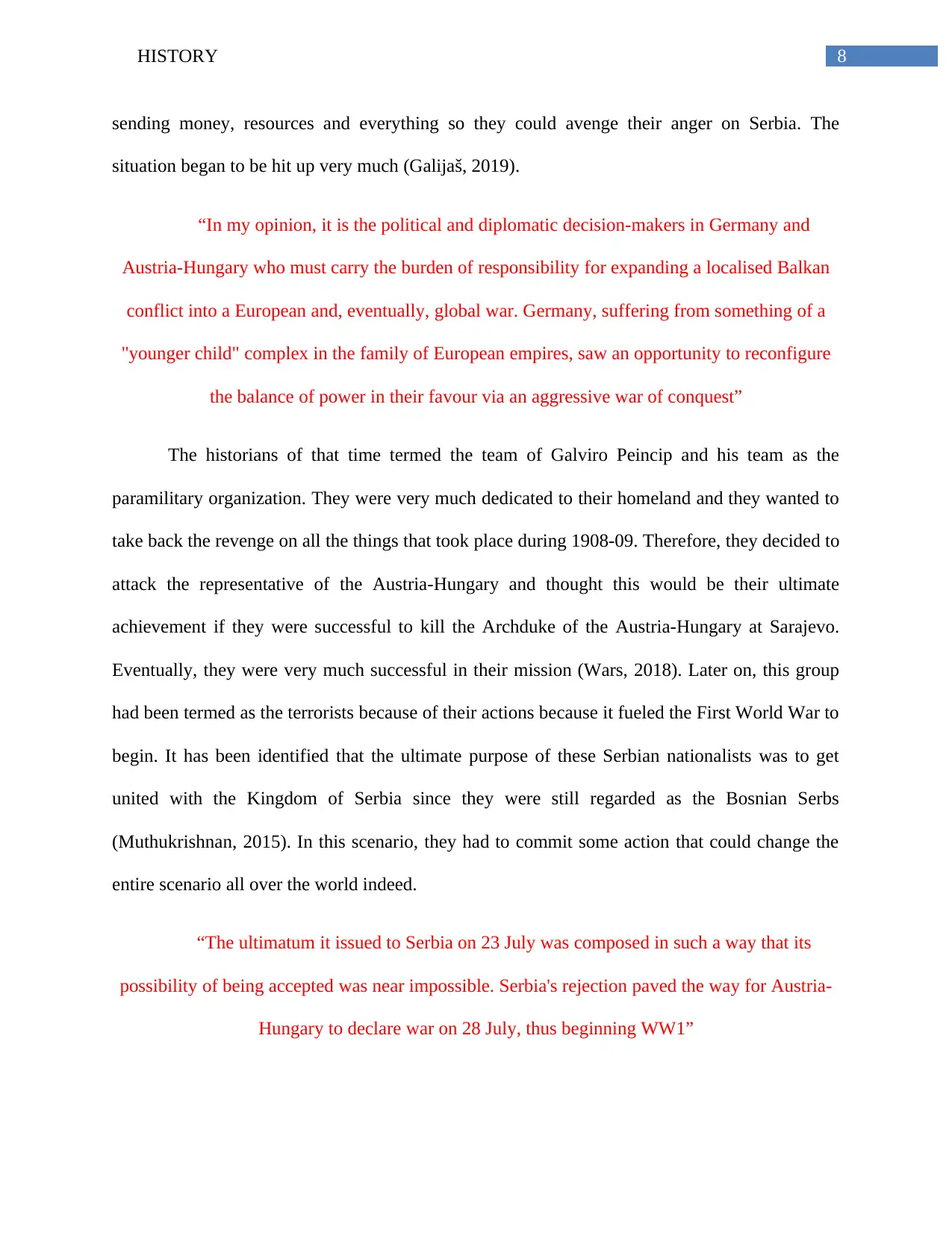
8HISTORY
sending money, resources and everything so they could avenge their anger on Serbia. The
situation began to be hit up very much (Galijaš, 2019).
“In my opinion, it is the political and diplomatic decision-makers in Germany and
Austria-Hungary who must carry the burden of responsibility for expanding a localised Balkan
conflict into a European and, eventually, global war. Germany, suffering from something of a
"younger child" complex in the family of European empires, saw an opportunity to reconfigure
the balance of power in their favour via an aggressive war of conquest”
The historians of that time termed the team of Galviro Peincip and his team as the
paramilitary organization. They were very much dedicated to their homeland and they wanted to
take back the revenge on all the things that took place during 1908-09. Therefore, they decided to
attack the representative of the Austria-Hungary and thought this would be their ultimate
achievement if they were successful to kill the Archduke of the Austria-Hungary at Sarajevo.
Eventually, they were very much successful in their mission (Wars, 2018). Later on, this group
had been termed as the terrorists because of their actions because it fueled the First World War to
begin. It has been identified that the ultimate purpose of these Serbian nationalists was to get
united with the Kingdom of Serbia since they were still regarded as the Bosnian Serbs
(Muthukrishnan, 2015). In this scenario, they had to commit some action that could change the
entire scenario all over the world indeed.
“The ultimatum it issued to Serbia on 23 July was composed in such a way that its
possibility of being accepted was near impossible. Serbia's rejection paved the way for Austria-
Hungary to declare war on 28 July, thus beginning WW1”
sending money, resources and everything so they could avenge their anger on Serbia. The
situation began to be hit up very much (Galijaš, 2019).
“In my opinion, it is the political and diplomatic decision-makers in Germany and
Austria-Hungary who must carry the burden of responsibility for expanding a localised Balkan
conflict into a European and, eventually, global war. Germany, suffering from something of a
"younger child" complex in the family of European empires, saw an opportunity to reconfigure
the balance of power in their favour via an aggressive war of conquest”
The historians of that time termed the team of Galviro Peincip and his team as the
paramilitary organization. They were very much dedicated to their homeland and they wanted to
take back the revenge on all the things that took place during 1908-09. Therefore, they decided to
attack the representative of the Austria-Hungary and thought this would be their ultimate
achievement if they were successful to kill the Archduke of the Austria-Hungary at Sarajevo.
Eventually, they were very much successful in their mission (Wars, 2018). Later on, this group
had been termed as the terrorists because of their actions because it fueled the First World War to
begin. It has been identified that the ultimate purpose of these Serbian nationalists was to get
united with the Kingdom of Serbia since they were still regarded as the Bosnian Serbs
(Muthukrishnan, 2015). In this scenario, they had to commit some action that could change the
entire scenario all over the world indeed.
“The ultimatum it issued to Serbia on 23 July was composed in such a way that its
possibility of being accepted was near impossible. Serbia's rejection paved the way for Austria-
Hungary to declare war on 28 July, thus beginning WW1”
⊘ This is a preview!⊘
Do you want full access?
Subscribe today to unlock all pages.

Trusted by 1+ million students worldwide
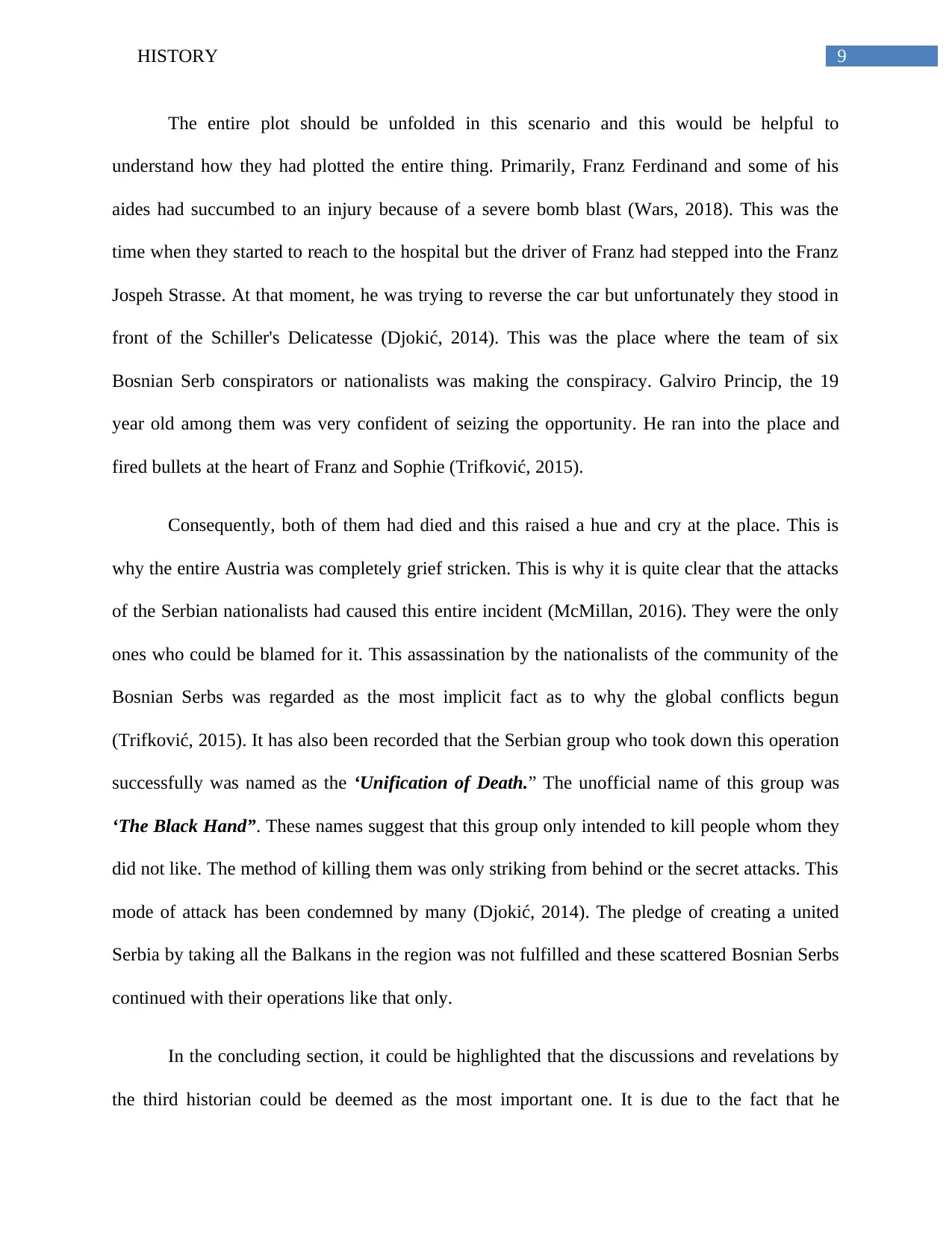
9HISTORY
The entire plot should be unfolded in this scenario and this would be helpful to
understand how they had plotted the entire thing. Primarily, Franz Ferdinand and some of his
aides had succumbed to an injury because of a severe bomb blast (Wars, 2018). This was the
time when they started to reach to the hospital but the driver of Franz had stepped into the Franz
Jospeh Strasse. At that moment, he was trying to reverse the car but unfortunately they stood in
front of the Schiller's Delicatesse (Djokić, 2014). This was the place where the team of six
Bosnian Serb conspirators or nationalists was making the conspiracy. Galviro Princip, the 19
year old among them was very confident of seizing the opportunity. He ran into the place and
fired bullets at the heart of Franz and Sophie (Trifković, 2015).
Consequently, both of them had died and this raised a hue and cry at the place. This is
why the entire Austria was completely grief stricken. This is why it is quite clear that the attacks
of the Serbian nationalists had caused this entire incident (McMillan, 2016). They were the only
ones who could be blamed for it. This assassination by the nationalists of the community of the
Bosnian Serbs was regarded as the most implicit fact as to why the global conflicts begun
(Trifković, 2015). It has also been recorded that the Serbian group who took down this operation
successfully was named as the ‘Unification of Death.” The unofficial name of this group was
‘The Black Hand”. These names suggest that this group only intended to kill people whom they
did not like. The method of killing them was only striking from behind or the secret attacks. This
mode of attack has been condemned by many (Djokić, 2014). The pledge of creating a united
Serbia by taking all the Balkans in the region was not fulfilled and these scattered Bosnian Serbs
continued with their operations like that only.
In the concluding section, it could be highlighted that the discussions and revelations by
the third historian could be deemed as the most important one. It is due to the fact that he
The entire plot should be unfolded in this scenario and this would be helpful to
understand how they had plotted the entire thing. Primarily, Franz Ferdinand and some of his
aides had succumbed to an injury because of a severe bomb blast (Wars, 2018). This was the
time when they started to reach to the hospital but the driver of Franz had stepped into the Franz
Jospeh Strasse. At that moment, he was trying to reverse the car but unfortunately they stood in
front of the Schiller's Delicatesse (Djokić, 2014). This was the place where the team of six
Bosnian Serb conspirators or nationalists was making the conspiracy. Galviro Princip, the 19
year old among them was very confident of seizing the opportunity. He ran into the place and
fired bullets at the heart of Franz and Sophie (Trifković, 2015).
Consequently, both of them had died and this raised a hue and cry at the place. This is
why the entire Austria was completely grief stricken. This is why it is quite clear that the attacks
of the Serbian nationalists had caused this entire incident (McMillan, 2016). They were the only
ones who could be blamed for it. This assassination by the nationalists of the community of the
Bosnian Serbs was regarded as the most implicit fact as to why the global conflicts begun
(Trifković, 2015). It has also been recorded that the Serbian group who took down this operation
successfully was named as the ‘Unification of Death.” The unofficial name of this group was
‘The Black Hand”. These names suggest that this group only intended to kill people whom they
did not like. The method of killing them was only striking from behind or the secret attacks. This
mode of attack has been condemned by many (Djokić, 2014). The pledge of creating a united
Serbia by taking all the Balkans in the region was not fulfilled and these scattered Bosnian Serbs
continued with their operations like that only.
In the concluding section, it could be highlighted that the discussions and revelations by
the third historian could be deemed as the most important one. It is due to the fact that he
Paraphrase This Document
Need a fresh take? Get an instant paraphrase of this document with our AI Paraphraser
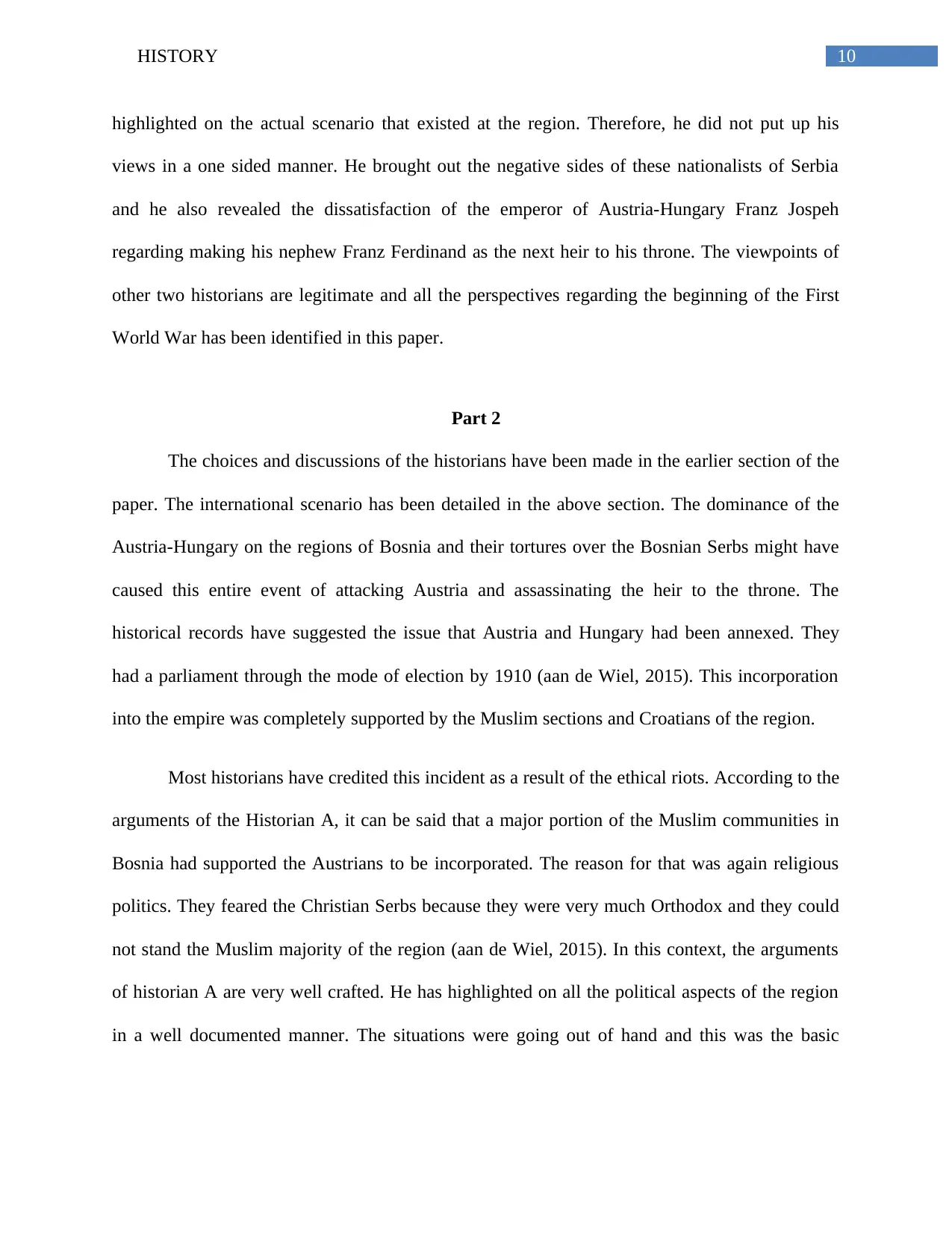
10HISTORY
highlighted on the actual scenario that existed at the region. Therefore, he did not put up his
views in a one sided manner. He brought out the negative sides of these nationalists of Serbia
and he also revealed the dissatisfaction of the emperor of Austria-Hungary Franz Jospeh
regarding making his nephew Franz Ferdinand as the next heir to his throne. The viewpoints of
other two historians are legitimate and all the perspectives regarding the beginning of the First
World War has been identified in this paper.
Part 2
The choices and discussions of the historians have been made in the earlier section of the
paper. The international scenario has been detailed in the above section. The dominance of the
Austria-Hungary on the regions of Bosnia and their tortures over the Bosnian Serbs might have
caused this entire event of attacking Austria and assassinating the heir to the throne. The
historical records have suggested the issue that Austria and Hungary had been annexed. They
had a parliament through the mode of election by 1910 (aan de Wiel, 2015). This incorporation
into the empire was completely supported by the Muslim sections and Croatians of the region.
Most historians have credited this incident as a result of the ethical riots. According to the
arguments of the Historian A, it can be said that a major portion of the Muslim communities in
Bosnia had supported the Austrians to be incorporated. The reason for that was again religious
politics. They feared the Christian Serbs because they were very much Orthodox and they could
not stand the Muslim majority of the region (aan de Wiel, 2015). In this context, the arguments
of historian A are very well crafted. He has highlighted on all the political aspects of the region
in a well documented manner. The situations were going out of hand and this was the basic
highlighted on the actual scenario that existed at the region. Therefore, he did not put up his
views in a one sided manner. He brought out the negative sides of these nationalists of Serbia
and he also revealed the dissatisfaction of the emperor of Austria-Hungary Franz Jospeh
regarding making his nephew Franz Ferdinand as the next heir to his throne. The viewpoints of
other two historians are legitimate and all the perspectives regarding the beginning of the First
World War has been identified in this paper.
Part 2
The choices and discussions of the historians have been made in the earlier section of the
paper. The international scenario has been detailed in the above section. The dominance of the
Austria-Hungary on the regions of Bosnia and their tortures over the Bosnian Serbs might have
caused this entire event of attacking Austria and assassinating the heir to the throne. The
historical records have suggested the issue that Austria and Hungary had been annexed. They
had a parliament through the mode of election by 1910 (aan de Wiel, 2015). This incorporation
into the empire was completely supported by the Muslim sections and Croatians of the region.
Most historians have credited this incident as a result of the ethical riots. According to the
arguments of the Historian A, it can be said that a major portion of the Muslim communities in
Bosnia had supported the Austrians to be incorporated. The reason for that was again religious
politics. They feared the Christian Serbs because they were very much Orthodox and they could
not stand the Muslim majority of the region (aan de Wiel, 2015). In this context, the arguments
of historian A are very well crafted. He has highlighted on all the political aspects of the region
in a well documented manner. The situations were going out of hand and this was the basic
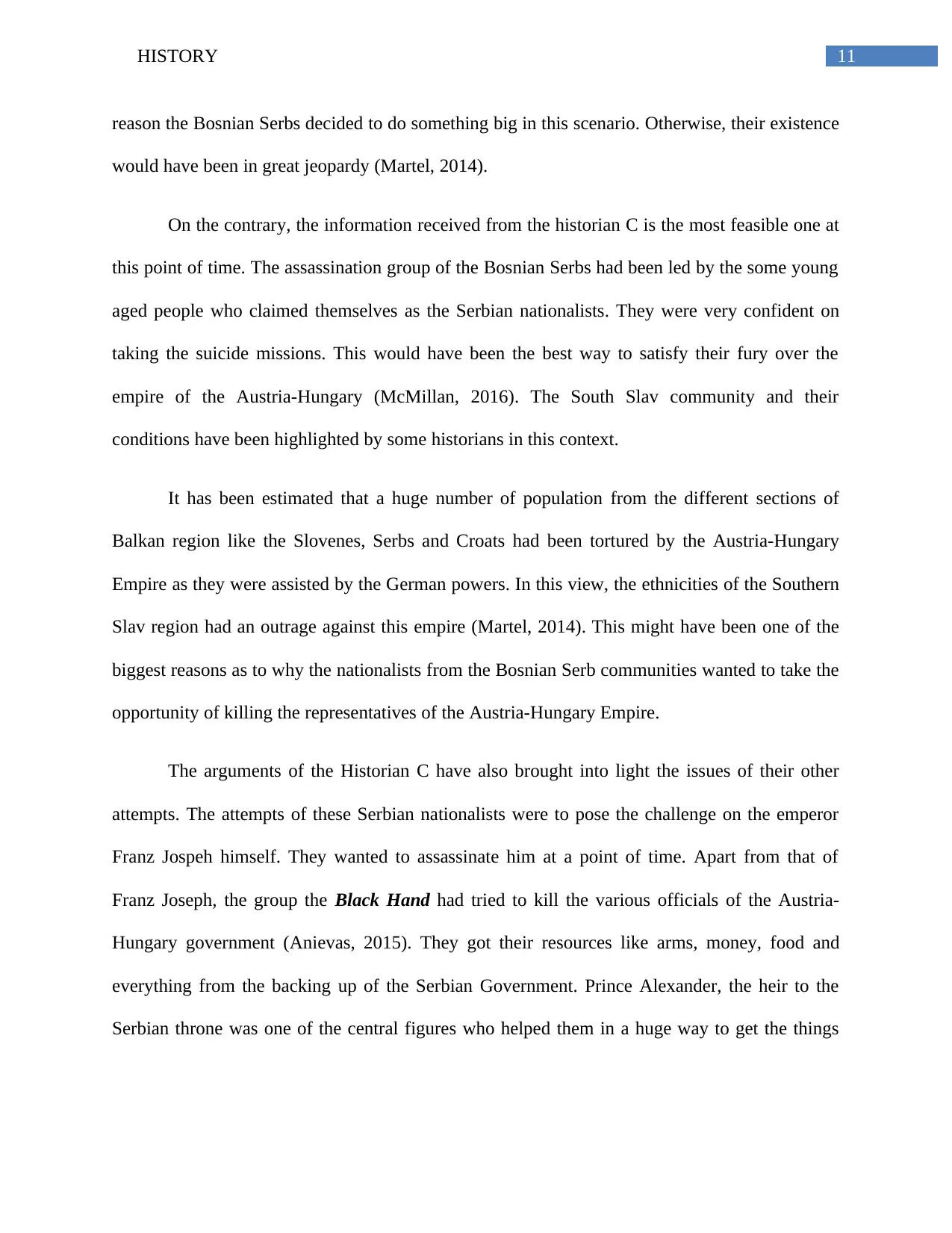
11HISTORY
reason the Bosnian Serbs decided to do something big in this scenario. Otherwise, their existence
would have been in great jeopardy (Martel, 2014).
On the contrary, the information received from the historian C is the most feasible one at
this point of time. The assassination group of the Bosnian Serbs had been led by the some young
aged people who claimed themselves as the Serbian nationalists. They were very confident on
taking the suicide missions. This would have been the best way to satisfy their fury over the
empire of the Austria-Hungary (McMillan, 2016). The South Slav community and their
conditions have been highlighted by some historians in this context.
It has been estimated that a huge number of population from the different sections of
Balkan region like the Slovenes, Serbs and Croats had been tortured by the Austria-Hungary
Empire as they were assisted by the German powers. In this view, the ethnicities of the Southern
Slav region had an outrage against this empire (Martel, 2014). This might have been one of the
biggest reasons as to why the nationalists from the Bosnian Serb communities wanted to take the
opportunity of killing the representatives of the Austria-Hungary Empire.
The arguments of the Historian C have also brought into light the issues of their other
attempts. The attempts of these Serbian nationalists were to pose the challenge on the emperor
Franz Jospeh himself. They wanted to assassinate him at a point of time. Apart from that of
Franz Joseph, the group the Black Hand had tried to kill the various officials of the Austria-
Hungary government (Anievas, 2015). They got their resources like arms, money, food and
everything from the backing up of the Serbian Government. Prince Alexander, the heir to the
Serbian throne was one of the central figures who helped them in a huge way to get the things
reason the Bosnian Serbs decided to do something big in this scenario. Otherwise, their existence
would have been in great jeopardy (Martel, 2014).
On the contrary, the information received from the historian C is the most feasible one at
this point of time. The assassination group of the Bosnian Serbs had been led by the some young
aged people who claimed themselves as the Serbian nationalists. They were very confident on
taking the suicide missions. This would have been the best way to satisfy their fury over the
empire of the Austria-Hungary (McMillan, 2016). The South Slav community and their
conditions have been highlighted by some historians in this context.
It has been estimated that a huge number of population from the different sections of
Balkan region like the Slovenes, Serbs and Croats had been tortured by the Austria-Hungary
Empire as they were assisted by the German powers. In this view, the ethnicities of the Southern
Slav region had an outrage against this empire (Martel, 2014). This might have been one of the
biggest reasons as to why the nationalists from the Bosnian Serb communities wanted to take the
opportunity of killing the representatives of the Austria-Hungary Empire.
The arguments of the Historian C have also brought into light the issues of their other
attempts. The attempts of these Serbian nationalists were to pose the challenge on the emperor
Franz Jospeh himself. They wanted to assassinate him at a point of time. Apart from that of
Franz Joseph, the group the Black Hand had tried to kill the various officials of the Austria-
Hungary government (Anievas, 2015). They got their resources like arms, money, food and
everything from the backing up of the Serbian Government. Prince Alexander, the heir to the
Serbian throne was one of the central figures who helped them in a huge way to get the things
⊘ This is a preview!⊘
Do you want full access?
Subscribe today to unlock all pages.

Trusted by 1+ million students worldwide
1 out of 19
Related Documents
Your All-in-One AI-Powered Toolkit for Academic Success.
+13062052269
info@desklib.com
Available 24*7 on WhatsApp / Email
![[object Object]](/_next/static/media/star-bottom.7253800d.svg)
Unlock your academic potential
Copyright © 2020–2026 A2Z Services. All Rights Reserved. Developed and managed by ZUCOL.





